#I see John's account being presented as an explaination
Note
I don't have the book at hand to quote, but what struck me when I was reading it was John going desperately from how he had to make them his hands and fingers!! to keep them!! he IMMEDIATELY segues into how he's so sad he had to feed the revenant beasts his fingers to keep them away :( it was so awful that they made him do that :( like he makes them possessions then having objectified them he justifies having to destroy his Things to keep himself safe. which I think is where he and Harrow are going to diverge. (noting that they've already taken very different tactics as far as the order of what gets kept safe)
It's the very next line! This quote picks up exactly where the last one left off:

That's definitely a legit way to read this passage, though it's not the way I prefer to. I mean. Hypocrisy found in God, fork found in kitchen. Come on. But yeah, that's an undeniably fucked up trajectory.
More seriously, I see John's chapters of Nona the Ninth as a confession, rather than as a justification. It's not meant to be coherent or consistant, just emotionally honest. He's expressing how he felt in the moments he made his decisions and asking to be understood, but he's not asking to be affirmed, or forgiven. "Just as there can be no forgiveness for me," and all.
The way in which his story does make sense—the way he's choosing to frame it—is fascinating for what it shows about John and what he's so deeply afraid of, in his heart of hearts. He loved them, and he sacrificed them, and then he sacrificed them again, but at least they didn't leave him.
And yet even in his confession there are still levels on which he seems to sincerely not understand what he's done wrong—mostly surrounding the autonomy and personhood of other people. Like you said, he objectifies people. He loves them as extensions of himself, because that is the only thing he understands as being real. He has no peers, as he is God. His closest friends are his fists and gestures, the fingers on his hand. As necessary to him as a limb, and losing them cripples him, but he doesn't understand them as people in their own right at all. And that lack of respect and understanding leads to him treating them horrifically.
It's kind of sad, in a way. Not to jump tracks completely, but the way John loves reminds me of this quote from episode 55 of Welcome to Night Vale:

It's presented in the context of a romantic couple, but it works more broadly. lt seems like the only way John knows how to love is by subsuming what he loves into himself, becoming one. Leaving him once again alone.
What's interesting is that he appears to know this about himself. Right in this quote, he directly compares himself to the Resurrection Beasts. Revenants that crack open worlds to eat their souls for sustenance, then pack the dead shells onto their exteriors to become part of themselves. As he sees it, the difference is that the Resurrection Beasts will eventually be satisfied. He won't be.
As for the parallels between John and Harrow, I don't think we need to look for where they're going to diverge. I think we can point to where they already have. And it's a fair comparison, to a time before John was God.
Look at John's reaction to his cult schisming, here:

He loves his friends, but he doesn't trust them. Deep down, he believes their love is conditional. If he fucks up, if he's caught slipping, if he admits he's wrong, he'll lose them. He's terrified of anyone finding out he's flawed, of the ugly parts of him being known, because he's certain anyone who sees that part of him will leave. He's gone ten thousand years like that, compounding lies to make them stay.
Harrow has a similarly harsh expectation of herself, but she's already taken her leap of faith, and let the mask drop. She's told the people she loves exactly who and what she is, with the full expectation they would punish or abandon her for it. With the full expectation Gideon would kill her for it, in the pool scene. And Gideon embraced her. She confronted Ortus with her failings in the River, and Ortus comforted her, and still chose to stay and risk his life to save her.
The people who loved John would have done the same for him. Did do the same for him. They stayed through his breakdown, they stayed by his side until it killed them, but John could never let his guard down enough to trust that they would have done it just for him. He couldn't submit to the mortifying ordeal of being known.
This is all, of course, working with the basic premise that the way John treats people is horrific, and he did have all the opportunites in the world to stop. He could have taken that plunge any time in the ten thousand and thirty-something years he's been alive, if he'd been strong enough to accept the consequences or believed in the rewards. It was all so fucking avoidable, but here we are. My favorite kind of tragedy.
#er. I realize I may have a different perspective on the whole god thing than many in the fandom and I don't mean offense!#it's just that gods are understood as being.... beings of pride I guess? they're disadvantaged by hubris#there are good reasons to worship them but their power obscures their ability to understand the true nature of reality#if siddhartha guatama had stayed a prince he would have been a great king but he would never have been the buddha y'know?#same principal#I think the main point of disagreement I have could be summed up as#I see John's account being presented as an explaination#not as an excuse#the locked tomb#emperor john gaius#ntn spoilers#nona the ninth#alexa play the saga of you confused destroyer of world lmao#hm. come to think of it john did have equivalents to the pool scene and the battle with the Sleeper and they fucking sucked#that's for another post
203 notes
·
View notes
Text
An excerpt from The Bezzle

I'm on tour with my new novel The Bezzle! Catch me next in SALT LAKE CITY (Feb 21, Weller Book Works) and SAN DIEGO (Feb 22, Mysterious Galaxy). After that, it's LA, Seattle, Portland, Phoenix and more!

Today, I'm bringing you part one of an excerpt from Chapter 14 of The Bezzle, my next novel, which drops on Feb 20. It's an ice-cold revenge technothriller starring Martin Hench, a two-fisted forensic accountant specialized in high-tech fraud:
https://us.macmillan.com/books/9781250865878/thebezzle
Hench is the Zelig of high-tech fraud, a character who's spent 40 years in Silicon Valley unwinding every tortured scheme hatched by tech-bros who view the spreadsheet as a teleporter that whisks other peoples' money into their own bank-accounts. This setup is allowing me to write a whole string of these books, each of which unwinds a different scam from tech's past, present and future, starting with last year's Red Team Blues (now in paperback!), a novel that whose high-intensity thriller plotline is also a masterclass in why cryptocurrency is a scam:
https://us.macmillan.com/books/9781250865854/redteamblues
Turning financial scams into entertainment is important work. Finance's most devastating defense is the Shield Of Boringness (h/t Dana Clare) – tactically deployed complexity designed to induce the state that finance bros call "MEGO" ("my eyes glaze over"). By combining jargon and obfuscation, the most monstrous criminals of our age have been able to repeatedly bring our civilization to the brink of collapse (remember 2008?) and then spin their way out of it.
Turning these schemes into entertainment is hard, necessary work, because it incinerates the respectable suit and tie and leaves the naked dishonesty of the finance sector on display for all to see. In The Big Short, they recruited Margot Robbie to explain synthetic CDOs from a bubble-bath. And John Oliver does this every week on Last Week Tonight, coming up with endlessly imaginative stunts and gags to flense the bullshit, laying the scam economy open to the bone.
This was my inspiration for the Hench novels (I've written and sold three of these, of which The Bezzle is number two; I've got at least two more planned). Could I use the same narrative tactics I used to explain mass surveillance, cryptography and infosec in the Little Brother books to turn scams into entertainment, and entertainment into the necessary, informed outrage that might precipitate change?
The main storyline in The Bezzle concerns one of the most gruesome scams in today's America: prison-tech, which sees America's vast army of prisoners being stripped of letters, calls, in-person visits, parcels, libraries and continuing ed in favor of cheap tablets that bilk prisoners and their families of eye-watering sums for every click they make:
https://pluralistic.net/2024/02/14/minnesota-nice/#shitty-technology-adoption-curve
But each Hench novel has a variety of side-quests that work to expose different kinds of financial chicanery. The Bezzle also contains explainers on the workings of MLMs/Ponzis (and how Gerry Ford and Betsy DeVos's father-in-law legalized one of the most destructive forces in America) and the way that oligarchs, foreign and domestic, use Real Estate Investment Trusts to hide their money and destroy our cities.
And there's a subplot about music-royalty theft, a form of pernicious wage theft that is present up and down the music industry supply-chain. This is a subject that came up a lot when Rebecca Giblin and I were researching and writing Chokepoint Capitalism, our 2022 book about creative labor markets:
https://chokepointcapitalism.com/
Two of the standout cases from that research formed the nucleus of the subplot in The Bezzle, the case of Leonard Cohen's batshit manager who stole millions from him and then went to prison for stalking him, leaving him virtually penniless and forced to keep touring to keep himself fed:
https://www.theguardian.com/music/2012/apr/19/leonard-cohen-former-manager-jailed
The other was George Clinton, whose manager forged his signature on a royalty assignment, then used the stolen money to defend himself against Clinton's attempts to wrestle his rights back and even to sue Clinton for defamation for writing about the caper in his memoir:
https://www.musicconnection.com/the-legal-beat-george-clinton-wins-defamation-case/
That's the tale that this excerpt – which I'll be serializing in six parts over the coming week – tells, in fictionalized form. It's not Margot Robbie in a bubble-bath, it's not a John Oliver monologue, but I think it's pretty goddamned good.
I'm leaving for a long, multi-city, multi-country, multi-continent tour with The Bezzle next Wednesday, starting with an event at Weller Bookworks in Salt Lake City on the 21st:
https://www.wellerbookworks.com/event/store-cory-doctorow-feb-21-630-pm
I'll in be in San Diego on the 22nd at Mysterious Galaxy:
https://www.mystgalaxy.com/22224Doctorow
And then it's on to LA (with Adam Conover), Seattle (with Neal Stephenson), Portland, Phoenix and beyond:
https://pluralistic.net/2024/02/16/narrative-capitalism/#bezzle-tour
I hope you'll come out for the tour (and bring your friends)!

Between 1972 and 1978, Steve Soul (a.k.a. Stefon Magner) had a string of sixteen Billboard Hot 100 singles, one of which cracked the Top 10 and won him an appearance on Soul Train. He is largely forgotten today, except by hip-hop producers who prize his tracks as a source of deep, funky grooves. They sampled the hell out of him, not least because his rights were controlled by Inglewood Jams, a clearinghouse for obscure funk tracks that charged less than half of what the Big Three labels extracted for each sample license.
Even at that lower rate, those license payments would have set Stefon up for a comfortable retirement, especially when added to his Social Security and the disability check from Dodgers Stadium, where he cleaned floors for more than a decade before he fell down a beer-slicked bleacher and cracked two of his lumbar discs. But Stefon didn’t get a dime. His former manager, Chuy Flores, forged his signature on a copyright assignment in 1976. Stefon didn’t discover this fact until 1979, because Chuy kept cutting him royalty checks, even as Stefon’s band broke up and those royalties trickled off. In Stefon’s telling, the band broke up because the rest of the act—especially the three-piece rhythm section of two percussionists and a beautiful bass player with a natural afro and a wild, infectious hip-wiggle while she played—were too coked up to make it to rehearsal, making their performances into shambling wreckages and their studio sessions into vicious bickerfests. To hear the band tell of it, Stefon had bad LSD (“Lead Singer Disease”) and decided he didn’t need the rest of them. One thing they all agreed on: there was no way Stefon would have signed over the band’s earnings to Chuy, who was little more than a glorified bookkeeper, with Stefon hustling all their bookings and even ordering taxis to his bandmates’ houses to make sure they showed up at the studio or the club on time. Stefon remembered October of ’79 well. He’d been waiting with dread for the envelope from Chuy. The previous royalty check, in July, had been under $250. The previous quarter’s had been over $1,000. This quarter’s might have zero. Stefon needed the money. His 1972 Ford Galaxie needed a new transmission. He couldn’t keep driving it in first.
The envelope arrived late, the day before Halloween, and for a brief moment, Stefon was overcome by an incredible, unbelieving elation: Chuy’s laboriously typewritten royalty statement ended with the miraculous figure of $7,421.16. Seven thousand dollars! It was more than two years’ royalties, all in one go! He could fix the Galaxie’s transmission and get the ragtop patched, and still have money left over for his back rent, his bar tab, his child support, and a fine steak dinner, and even then, he’d end the month with money in his savings account.
But there was no check in the envelope. Stefon shook the envelope, carefully unfolded the royalty statement to ensure that there was no check stapled to its back, went downstairs to the apartment building lobby and rechecked his mailbox.
Finally, he called Chuy.
“Chuy, man, you forgot to put a check in the envelope.”
“I didn’t forget, Steve. Read the paperwork again. You gotta send me a check.”
“What the fuck? That’s not funny, Chuy.”
“I ain’t joking, Steve. I been advancing you royalties for more than three years, but you haven’t earned nothing new since then—no new recordings. I can’t afford to carry you no more.”
“Say what?”
Chuy explained it to him like he was a toddler. “Remember when you signed over your royalties to me in ’76? Every dime I’ve sent you since then was an advance on your future recordings, only you haven’t had none of those, so I’m cutting you off and calling in your note. I’m sorry, Steve, but I ain’t a charity. You don’t work, you don’t earn. This is America, brother. No free lunches.”
“After I did what in ’76?”
“Steve, in 1976 you signed over all your royalties to me. We agreed, man! I can’t believe you don’t remember this! You came over to my spot and I told you how it was and you said you needed money to cover the extra horns for the studio session on Fight Fire with Water. I told you I’d cover them and you’d sign over all your royalties to me.”
Stefon was briefly speechless. Chuy had paid the sidemen on that session, but that was because Chuy owed him a thousand bucks for a string of private parties they’d played for some of Chuy’s cronies. Chuy had been stiffing him for months and Stefon had agreed to swap the session fees for the horn players in exchange for wiping out the debt, which had been getting in the way of their professional relationship.
“Chuy, you know it didn’t happen that way. What the fuck are you talking about?”
“I’m talking about when you signed over all your royalties to me. And you know what? I don’t like your tone. I’ve carried your ass for years now, sent you all that money out of my own pocket, and now you gotta pay up. My generosity’s run out. When you gonna send me a check?”
Of course, it was a gambit. It put Stefon on tilt, got him to say a lot of ill-advised things over the phone, which Chuy secretly recorded. It also prompted Stefon to take a swing at Chuy, which Chuy dived on, shamming that he’d had a soft-tissue injury in his neck, bringing suit for damages and pressing an aggravated-assault charge.
He dropped all that once Stefon agreed not to keep on with any claims about the forged signature; Stefon went on to become a good husband, a good father, and a hard worker. And if cleaning floors at Dodgers Stadium wasn’t what he’d dreamed of when he was headlining on Soul Train, at least he never missed a game, and his boy came most weekends and watched with him. Stefon’s supervisor didn’t care.
But the stolen royalties ate at him, especially when he started hearing his licks every time he turned on the radio. His voice, even. Chuy Flores had a fully paid-off three-bedroom in Eagle Rock and two cars and two ex-wives and three kids he was paying child support on, and Stefon sometimes drove past Chuy Flores’s house to look at his fancy palm trees all wrapped up in strings of Christmas lights and think about who paid for them.
ETA: Here's part two!

If you'd like an essay-formatted version of this post to read or share, here's a link to it on pluralistic.net, my surveillance-free, ad-free, tracker-free blog:
https://pluralistic.net/2024/02/17/the-steve-soul-caper/#lead-singer-disease
#pluralistic#the bezzle#martin hench#marty hench#red team blues#fiction#crime fiction#crime thrillers#thrillers#technothrillers#novels#books#royalties#wage theft#creative labor
99 notes
·
View notes
Text
First-Order Archangels
Part 3: Seeing Eye to Eye
Part 1: Maybe You'll See An Archangel
Part 2: Foils of War
This is a topic I've wanted to address for some time (ha!) concerning a discussion around Jim's moments of lilac-eyed possessed prophecy and Crowley not wearing his sunglasses around Jim inside the bookshop in S2. I've had rough thoughts about what's going on at these times, but because its more of a sub-textural implication, rather than being overtly stated I guess I've hesitated somewhat and wanted to think it through properly first. Then I started writing this, and as I starting checking things, one thing led to another...and it's tripled in size. Enjoy the juicy long length!
I've decided to included this meta as part of the First-Order Archangel series as it will focus on Gabriel and Crowley, and their connection with time and prophecy. Both of them wear wristwatches - Gabriel seems to wear one instead of an angel ring, which I find most curious. Both have moments where they talk about the future that has been revealed to them. But when it comes to the Great Plan of the Almighty, they couldn't be more opposite.

The Seer and the Herald
Time is Crowley's domain. He can stop it for short periods, and he seems to know about fragments of human science and technology in the future. For example, he suggests to Mr Dalrymple that a change in hygiene might be beneficial, upon meeting him. It could also be said that he acts an oracle, as he gives advice and counsel, both here with Mr Dalrymple and in 1941 when he warns the Nazi's to flee before the bomb arrives, and that they won't like what comes after. (Although, 1941 was a case of Crowley actively manipulating the outcome of the future, so perhaps that doesn't count.)
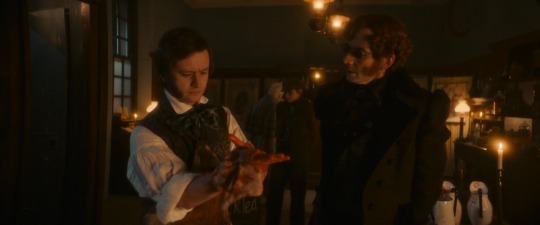
Crowley: You might want to think about washing your hands. It's gonna be all the rage in a few years, I'm telling you.
Gabriel, as the Herald, is also given knowledge of the future. It was said he spoke to Daniel several times, explaining the visions Daniel had, which were of things to yet to come, and he was tasked with the "foretelling" of the births of John the Baptist and Jesus to their prospective mothers. I realize none of these examples are GO canons (yet,) but there is also the interesting parallel character in S1 of the lawyer Giles, who delivers the second manuscript of Agnes Nutter to Newt and Anathema the day after the Nopocalypse in S1 who is definitely Gabriel-coded and "heralding" the future possibilities there.
Tense Moments
There are two times during S2 that Jim is possessed by a divine spirit that takes over his corporation, turning his eyes back to Supreme Archangel Gabriel-lilac and putting words into his mouth.
The first instance is about the past: in S2E2 Jim recites a verse from Job 38:7 - and Aziraphale and Crowley both remember it, because they were there when the words were said.
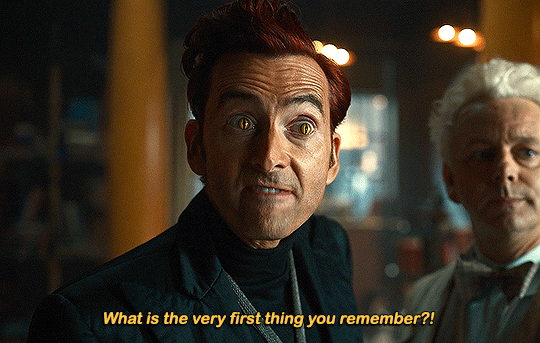
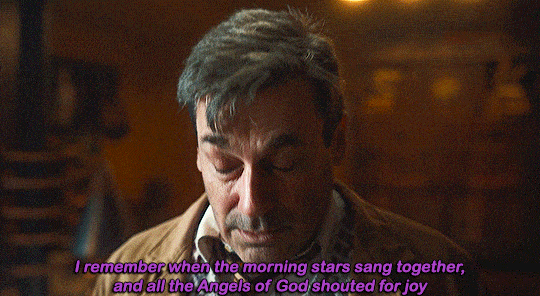
The second instance, towards the end of S2E3, is about the present...
"There will come a tempest, and darkness, and great storms."
...and the future.
"And the dead will leave their graves and walk the earth once more. And there will be great lamentations."
Past, present, and future. For both of them, Crowley has his sunglasses off and he is peering into Jim's face.
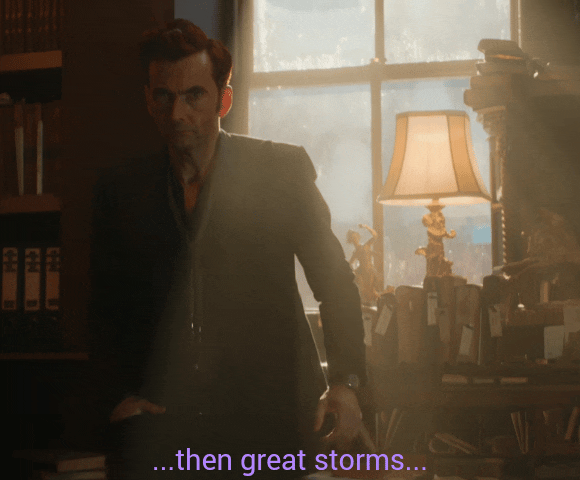
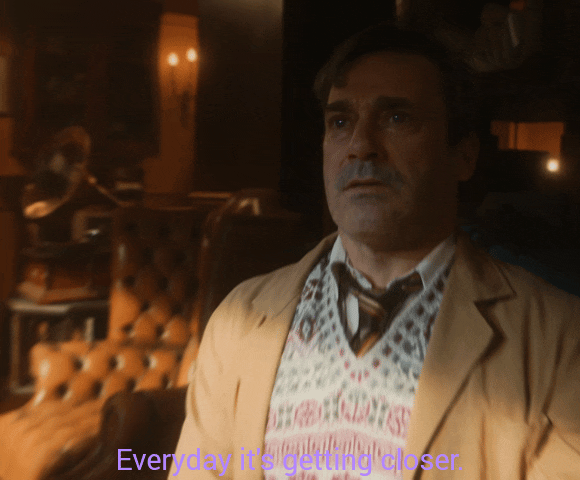
I have some notes about which verses these are supposed to be from (Hebrews 12:18 for the first half and Matthew 27:53 for the second half) but upon checking them I'm wondering if they are actually correct, even if we take into account they have probably been re-written for the show, like the lines from the Book of Job were paraphrased in the Job minisode. But that aside, we can still deal with them within their temporal frames of reference - the former describing the not-insignificant piece of weather-work that Crowley had just stirred up, and the latter is pointing to the Second Coming, with the resurrection of the dead.
Both halves have words of significance: The first half has the word tempest, and the second half has the word lamentations.
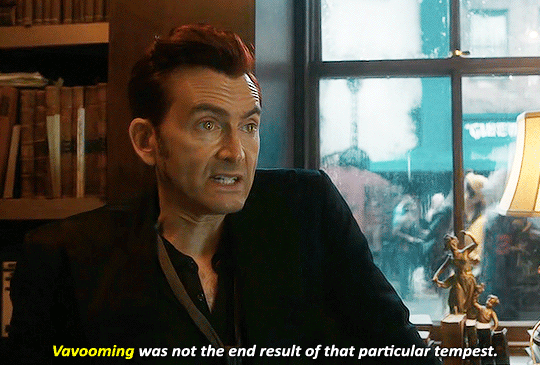
The Foreshadowing Storm
Storms are often used as a trope to foreshadow trouble in the future of a story. I don't think we tend to see Crowley's rain storm as foreshadowing of what is to come as he was in control of that storm and it was for a particular reason - which failed. But Jim's words contained the future tense of "will" - There will come a tempest - so lets have a look at some possible connotations.
A tempest is a violent storm or thunderstorm, but it can also be an situation in which people are very angry or excited, an upset, calamity, or some unexpected misfortune.
And you could say that did happen by the end of S2.
There is also Shakespeare's play, The Tempest, which our demon would no doubt be aware of (it's considered a romance - you know, once of the funny ones.) In it there is a wizard of sorts, Prospero, the former Duke of Milan, who was usurped from his position, and fled with his infant daughter to an island. Many years later the King of Naples and the Duke's brother are passing in a ship, so Prospero magically whips up a storm and shipwrecks them on the island with him and his now teenage daughter, Miranda. He then tries to manipulate a romance between the King's son and heir and Miranda. Other stuff happens as well but in the end they all escape the island and there is a kind of happy ending, and forgiveness.
The Book of Lamentations
Back to the second half, that is supposed to be from Matthew 27:53, but probably more likely Matthew 27: 52-54. Yes, these verses do describe the dead rising from the grave, but the use of "great lamentations" here is a paraphrasing flag being waved in our faces.
A lament is a passionate expression of grief or sorrow. It can also be a complaint, or an expression of regret or disappointment.
Biblically, a lament is a prayer expressing sorrow, pain or confusion.
And with that, we can go back and re-contextualize a scene from S1.
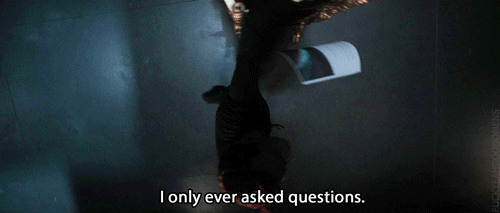
The Book of Lamentations in the Bible contains five chapters describing the destruction of Jerusalem by the Babylonians in 587 B.C. after a long siege. Each chapter is a poem from a different viewpoint about this event.
But what do we have in S1E4 instead? We have Crowley with a book of things he helped to build, expressing sorrow and pain at their imminent destruction, and that of the humans and the Earth. He prays to God, asking questions in vain hope of finding answers to his confusion as to why it seems it must all end with such finality.
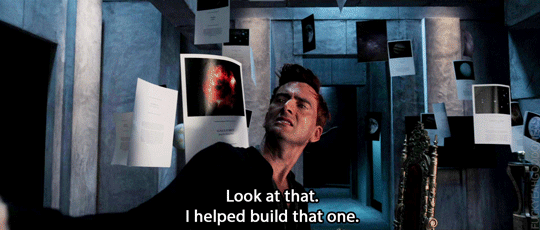
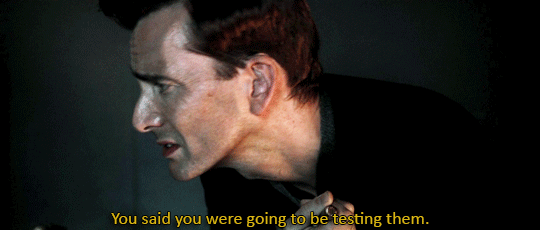
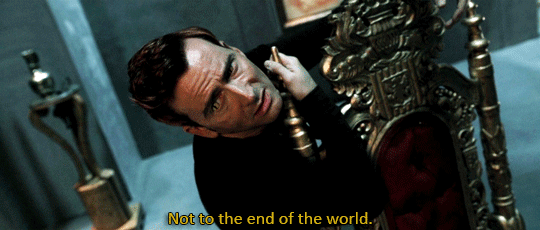
Jerusalem was destroyed a second time, in 70 C.E. by the Romans. The city was rebuilt, and still stands today, but the Temple of Solomon wasn't, and this is a topic of contention in some beliefs. This also fits in with the theme of Memento mori, "Remember that you die," a reminder that life is brief, and there is a cycle to life and death.
Nonetheless, the Second Coming is connected with a New Jerusalem, a walled garden (a paradise) where those with their names written in the Book of Life will reside, with access to the Tree of Life in the middle.
Within the Walls of The Garden
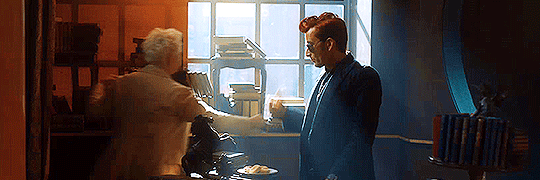
The bookshop is Aziraphale's modern day re-creation of the Garden of Eden. Within it's walls he has gathered knowledge that he protects, there is a circular "gate" at the entrance, and he's made it a sanctuary for him and Crowley from other supernatural beings, particularly demons.
During S2 we see Crowley spend quite a bit of time inside the bookshop, and more often than not, he has his sunglasses off here.
While we can understand Crowley not wearing his sunglasses around Aziraphale, its perhaps more surprising that he doesn't seem to worried to not wear them around Jim either. He gets into Jim's face, eye to eye, but they don't agree with one another. It takes a lot of questions, from both sides, to turn this around.
The Great Plan

There's the Great Plan, and the Ineffable Plan.
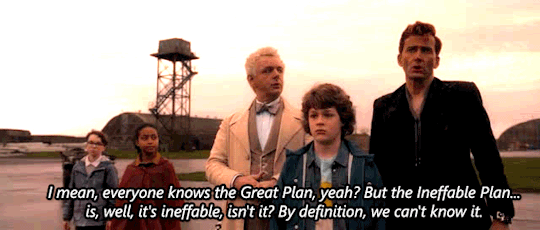
Gabriel would never dream of deviating from the Plan.
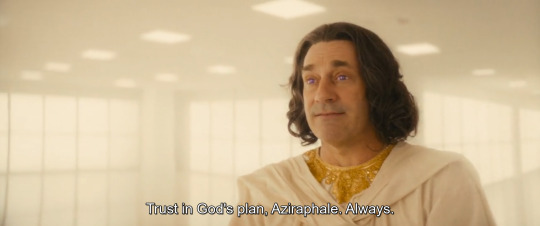
At least he didn't, until he said "no" to the second Apocalypse.

Gabriel: Anyway, Armageddon the Sequel, that's a nah.
His own plan went awry when he forgot where he was going.
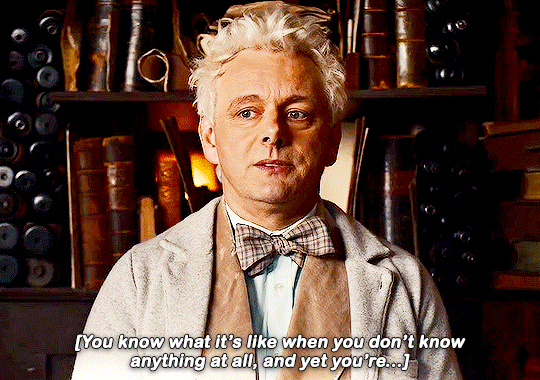
AZIRAPHALE: Then why did you come to my shop?
GABRIEL: I don't know. I just thought I should. You know what it's like when you- when you don't know anything at all, and yet you're totally certain that everything would be better if you were just near one particular person?
And with his memories gone it was time to relearn things from the beginning. Good thing the original teacher from The Beginning was on hand to give some lessons, because we seem to be repeating some things from S1 and the beginning again here.
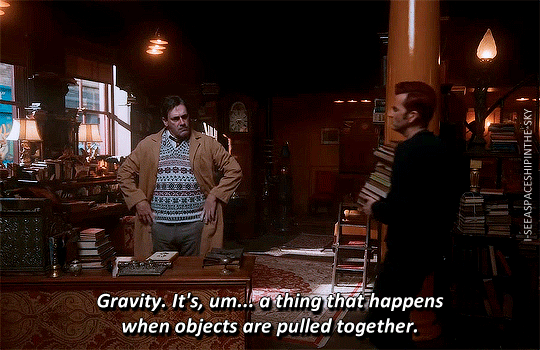
Right. So who's got a plan? Who's not seeing it this time? Are you actually questioning Crowley's plan, Jim? That's not like you to question plans. Maybe you are finally learning something.
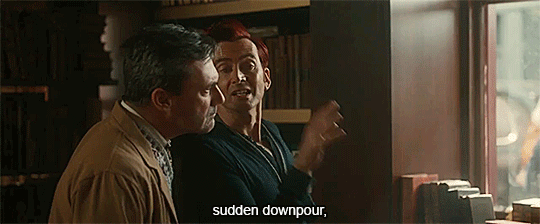
Crowley's other plan was give "Jim" a test, to see if Gabriel was really there. This time Jim was prepared to follow instructions without questions. The gravity of the situation was kind of lost on him, and Crowley had to stop him before it was too late.
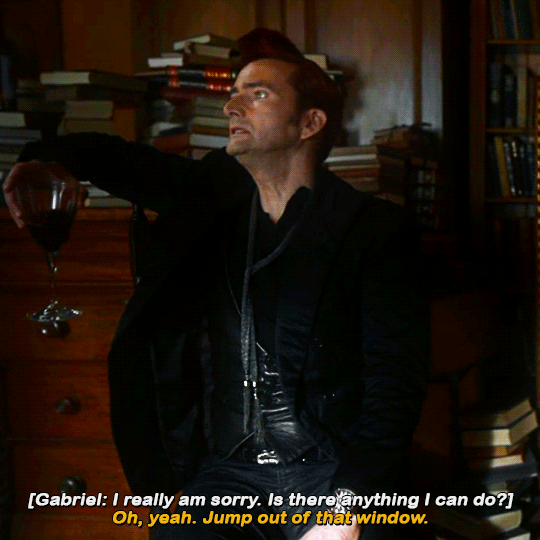
Too Early, Too Late
Prophecies are not just about who, what and where, they are also about when.

Crowley makes an angry threat to Jim in reaction to Shax's visit to the bookshop but backs off to enigmatically remark that "it's always too late." There is also the 1827 Resurrectionist minisode, where Crowley stops Aziraphale from healing wee Morag after she is shot with the grave guns, telling him it is too late there, and I think there is even a mention of too late by Shadwell in S1, but I can't remember where (plus Crowley's watch in the book, that has a time-zone in Another Place that is always Too Late.) We are kind-of left hanging here - what is too late? Too late to stop what is already in motion?
Except when its early, and early seems to be associated with destruction as well in the Good Omens AU. We have the examples of Job's house being destroyed, and the arrival of the baby Antichrist, which heralds the destruction of the Earth.
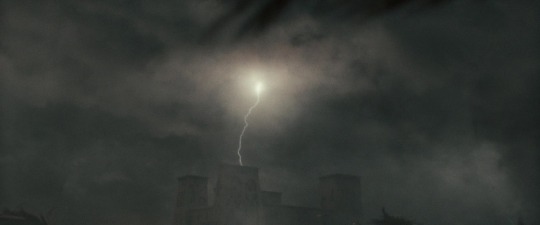
CRAWLEY: Oh. They've started early. Well… Might as well get comfortable. [sniffs wine and pours a glass]
Here, when the Antichrist is delivered in S1E1, Crowley expresses dismay that the time has come so soon.
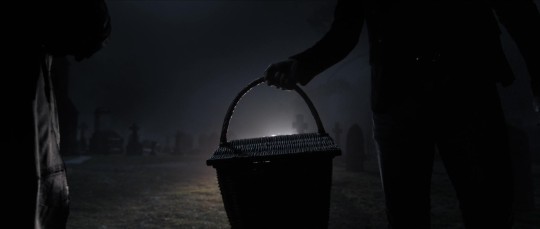
CROWLEY: "No. Already?"
Could it actually be that the Nopocalypse was too early? And was that why it didn't go to Plan?
The Chosen One
The Antichrist is a sub-trope of The Chosen One tropes, which in itself is prophecy trope. The Chosen One is needed to fulfill the prophecy. We could do a whole line of discussion on how Crowley and Aziraphale then try to subvert this by raising the said Chosen One, only they raised the Wrong One. Instead, I want to point out that Crowley was also a Chosen One. He was chosen to deliver the Antichrist to the satanic nuns on the appointed night. But why? Why didn't Hastur and Ligur just do it?
Ah, you missed that, did you? I don't blame you, and Frances was trying to distract you with a game of three-card monte with the babies as well (and there have been many discussions about that, too!)
This then makes an interesting parallel for Gabriel being the Herald of the first Christ, and Crowley being the Herald for the Anti-Christ. (Or, some meta-ops might even argue, the Second Christ! But that is yet to be determined. How far away is S3 again...?)
The Earth is a Libra
One final prediction, from the very beginning...
Do you recall this seemingly random daily star sign reading from the opening of S1E1?
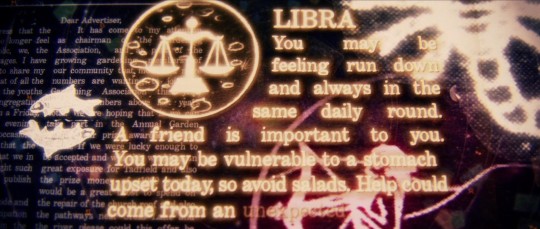
Most of it makes sense.
A friend is important to you.
uh huh.
Help could come from an unexpected source.
uh huh.
You may be vulnerable to a stomach upset today, so avoid salads.
wot?
I had to kick myself after while on this one, because I was being all smug to myself about catching a quick mention of liver between Madame Tracy and Shadwell at one point, and any mention of a bodily organ is a reference to an emotion and/or virtue. The first thing one must do with deciphering organs is determine whether you are looking at a western or eastern philosophy, as that is most important, but because this is GO we also need too include any biblical influence.
And whoeee - jackpot! There is indeed some symbolism around the stomach in a biblical sense; it is a place of transformation and renewal, where food is broken down and transformed into new energy and the renewing of minds. It emphasizes the need for continual growth and spiritual renewal.
That should ring some bells with you straight away, I would hope.
And the salad? A salad is a mix of different foods together. Foods not separated. (Keep your angels and demons on different sides of the plate, please, no mixing - and don't play with your food!)
#good omens#good omens 2#good omens meta#crowley#gabriel#seeing eye to eye#its about time#the ineffable plan#the great plan#there will come a tempest#great lamentations#the book of lamentations#prophecy tropes#the chosen one#the foreshadowing storm#its always too late#the earth is a libra#avoid salads
31 notes
·
View notes
Text

January-February 1950. Since the 1978 SUPERMAN movie with Christopher Reeve, Jonathan and Martha Kent have generally been depicted as farmers, but in the pre-Crisis comics, they actually sold the farm before Clark Kent entered high school and bought a general store in Smallville, where Clark often helped out as a clerk or stock boy. In this story from SUPERBOY #6, Clark leaves school for a few days to run the store after Jonathan Kent twists his ankle.

The Superboy strip was careful to note that the Kents HAD been farmers at the time they found Kal-El's rocket ship, to avoid contradicting past accounts of Superman's origin. However, moving the Kents into town made more sense for the Superboy strip, since it made it easier to introduce supporting characters from Smallville (for instance, Lana Lang first appeared in SUPERBOY #10). Also, running the store was somewhat less strenuous than farming for the Kents, who were generally depicted as relatively spry but obviously elderly, looking more like teenage Clark's grandparents than his parents.
So, why have modern stories again focused on the Kents as farmers? The salt-of-the-earth family farmer remains an important piece of American cultural mythology with powerful political connotations despite its very limited relevance to the realities of modern agribusiness. Modern Superman media, particularly the live-action movies, tends to play this to the hilt, elevating Jonathan Kent the hardworking farmer to a kind of saintly figure of plainspoken middle-American values. This is also a useful prop for the nativist leanings of the post-Crisis comics, which seek to affirm Superman's bona fides as a true-blue, native-born American champion.
Indeed, John Byrne's 1986 MAN OF STEEL miniseries is explicit in its representation of farming as an exemplar of moral virtue. In explaining to Lara why he intends to send Kal-El to Earth, Jor-El says he has selected Earth because it resembles Krypton in its prelapsarian Golden Age past, possessing "a fullness of life we have denied ourselves...but which I shall give back to our son!" He then displays this image:
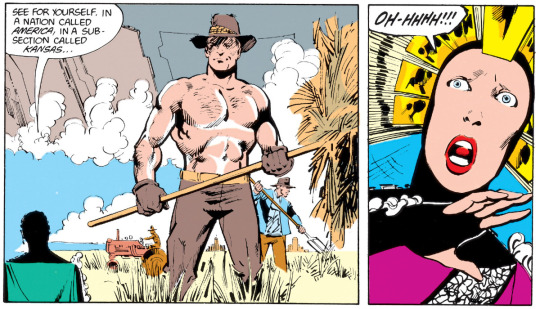
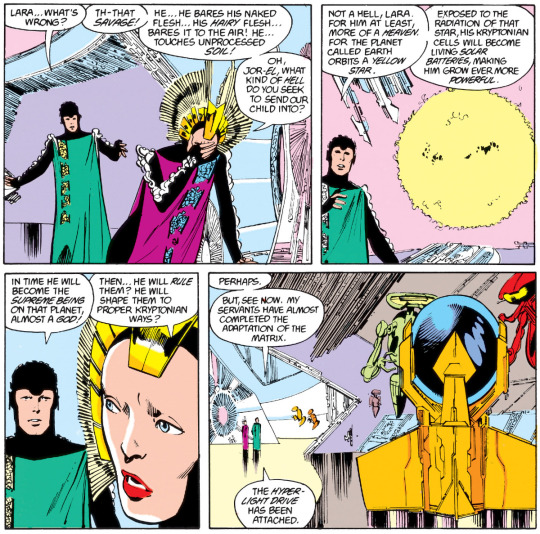
This is a pretty blatantly fascist argument: As Jor-El explains, escaping from the poison of modern Krypton to embrace the earthy traditional values from which Lara recoils will make their son a "supreme being," "almost a god." Note also that Lara, who unlike Jor-El has never questioned Kryptonian cultural mores, reacts in a way the reader is expected to see as sinister: suggesting that their son will use his power to become a tyrant and impose "proper Kryptonian ways" (which Byrne presents, both here and in the subsequent WORLD OF KRYPTON, as corrupt, inhuman, and sterile) on the people of Earth. Jor-El doesn't seek to argue the point, since his plan will in effect inoculate Kal-El against the corrupting moral influence of his mother and his native culture by delivering him from the doomed decadence of Krypton into the care of simple, decent Midwestern farmers like the one in the image he showed Lara previously, to become a champion of American populism.
It's not subtle, and it's quite unsavory, for all the admittedly slick prettiness of Byrne's storytelling.
#comics#superboy#john sikela#the writer of the superboy story is unknown#clark kent#jonathan kent#martha kent#smallville#man of steel#john byrne#dick giordano#i can appreciate the desire of the post-crisis reboot#to dispel the lingering air of stale hokiness#that afflicted the superman books in the later julie schwartz years#but i find byrne's conception of superman ideologically objectionable#and frequently antagonistic
15 notes
·
View notes
Text
Okay, fucking hell. I have been looking forward to the start of season 15 for so long, and when it finally happened, I got delayed even longer. Missed it the night it happened because I had to go out and live in the real world, then the next day I got really busy with work, then had to go five hours out of town and get no sleep in a terrible hotel room before spending yesterday yelling at some teenagers while they fought other teenagers, then got home today and had to do more work stuff. Now, finally, on Sunday evening, I get to do the thing I’ve really wanted to do for several days now, which is sit down and watch this fucking Taskmaster episode that aired on Thursday.
At long last, here are my thoughts on Taskmaster s15e01, written as I watch it:
- If you take into account Alex Horne’s fame for giving very memorable performances in Dictionary Corner of Catsdown, as well as impressive performances as a proper contestant on the real Countdown, this might be the best of all the “Greg gives Alex an insulting nickname” jokes they’ve ever done, thrown in as one of the very first lines in this season.

- Oh good, I have no good reason for this but I enjoy the prize tasks with a size or weight stipulation. I just think it’s funny to see the wildly different directions people can go with things that are about the same size.
- Well, this show promised us Frankie Boyle being a human being for once, and here he is bringing his kids into it in the first thing he says. And then having a delightful little exchange where he calls Greg creepy for wanting a painting of him in his house. Lovely, no notes.
- Okay, when the trailer came out recently and spoiled the fact that Frankie and Ivo are the team of two, I said that’s great, because I know this might not say anything great about me, but I do find the “one contestant being terrified of another” dynamic hilarious, when it happens on Taskmaster. Dara O’Briain and John Kearns played it to perfection last season, and if anything could match that, it would be Frankie Boyle getting paired with a younger, skittish, susceptible-to-pressure Englishman who’s built a career on talking about how posh he is. My hopes for this were only buoyed when Frankie’s interview came out, and it turns out that after filming the tasks (including team tasks) but before filming the studio stuff, his answer to “Who’s your biggest rival?” was “Everyone except Ivo.” Ivo’s interview came out just today, and his answer to that question was to stammer slightly while saying “Frankie”.
I almost feel bad for expressing how funny I find the idea of this dynamic, because it’s not a good thing. Disclaimer: I think schoolyard bullying in real life is very bad. And I suppose there’s some level it can reach on panel shows, after which it would stop being funny. I’ve seen a few examples, across many years of television, of panel show bullying going so far that it’s not funny anymore. But I do tend to find it really funny until it reaches that level.
I give all the background because Frankie was the first person to present his prize, and Ivo had to go second. While this happened, I though Ivo looked and sounded a bit terrified, possibly just from having to explain something with Frankie Boyle looming over him.

But then I thought, okay, I’ve made so many assumptions about that dynamic before the season even started, that I’m projecting them onto what is clearly just a completely normal prize task description. He might sound slightly stilted, but there’s no need to imagine that he’s noticeably bothered by anything this early in the season.
But then Greg cut him off mid-sentence to ask:

And then they all stopped to acknowledge how weird it was that Ivo Graham sounded unnecessarily terrified, and then he immediately got bullied by Frankie Boyle, saying he sounds like he’s playing a game where he can’t say certain words. I’m not imagining it, everyone! Team Franko (just coined that one, will be using it any time I reference them in any post I make this season, add it to the list of Taskmaster teams with convenient portmanteaus, like Vicotrialan and Morguziree) is going to be fun. I’m sorry, I really do like Ivo Graham, but I kind of want to see him get crushed. To be fair, I think he’d be the first to admit that part of his appeal as a comedian is it’s funny to watch him get crushed.
- I haven’t gotten to the scoring yet, but Jenny got robbed in that chat, eggs are dependable as hell. Quick, easy, convenient, good for you, cheap, last longer than most things that aren’t processed food. Solid prize. Also, Jenny Eclair’s the one I know the least about, but I immediately like her energy. Based on the few YouTube clips of her I’ve seen, I predicted her Taskmaster persona might be Jo Brand’s level of giving a shit with Rob Beckett’s level of energy. So far, we’re on track for that to be true.
- Took this screenshot entirely because this joke of Alex’s seemed to unnoticed by the audience, and it deserved more.

- So, based on only his prize task presentation, I’m getting that Kiell is going with “wildly enthusiastic, going ironically over the top in selling himself” energy. Making me think of Guy Williams from Taskmaster NZ a bit. I like it.
- Slightly weird to see Mae Maritn introduce a prize task so soon after watching their new stand-up special, as their enthusiastic prize task selling persona is very similar to their stand-up persona. And to their self-insert sitcom character. Basically, I’m pretty sure this is just the actual Mae Martin we get every time. And it’s absolutely captivating. I promise I will try not to mention how incredibly attractive they are too many times before this season is over.
- Oh, I wrote the above point before seeing Mae’s actual prize, and I need to come back and say they nailed that one. 1) A full English breakfast is awesome. 2) Bringing in that kind of food plays perfectly to Greg’s tastes, the mark of a student of the game. 3) Perfectly fits the remit. A breakfast like that can get you ready for anything - dependable. And I love that they bothered to specifically make it a kilo. I mean, I assume all Mae actually did was tell the producers to measure out a kilo, they weren’t putting food on scales themself. But still. I admire the commitment of saying they want to follow the instructions perfectly. That is how you do a prize task.
- Alex calling Ivo out in the moment for not getting the remit right, letting them all make fun of him for that, and then casually mentioning at the end that Frankie was also way off - very funny. Also, Frankie Boyle got overscored pretty hard there, as a painting of himself on a horse is neither one kilo nor dependable. Should have been an easy one point. But I get it, Greg. It’s Frankie Boyle. The inherently interesting nature of the enigmatic character-within-a-character Frankie Boyle being weirdly human does feel like it should be rewarded with points, though if we keep seeing things that way he’ll win every task all season.
- Well, Kiell wins the Fun Outfit Award this season.
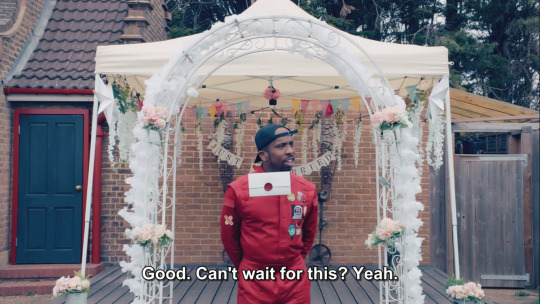
Jenny wearing something that could be a costume but could also just be how she dresses. Frankie dressing down, because he’s insufficiently jolly for costumes. Ivo turning up in what looks like a school gym class uniform, because otherwise he might not give off a strong enough vibe of “student who’s bad at sports getting bullied during gym class”. And Mae wins the award for “Jesus, it’s only a track suit, how can I think someone’s clothing choice makes them look so attractive when all they’ve done is put on a track suit?”
- Oh yeah. The joke about it being funny that Frankie Boyle is so far out of his element is going to take a while to get old. It might get old at some point, but that one has some mileage in it.

- Does the music playing in the background while they discuss their choreography remind anyone else of the But I’m a Cheerleader soundtrack?
- Alex mentioned that he’s had proposals and stag dos on Taskmaster before. He’s also choreographed dances before, circa season 4. To ringtones, that time.
- Jenny Eclair threatening to infect Alex with trench vagina on their wedding night is definitely backing up the idea of her having Jo Brand vibes. But she did say it with the enthusiasm of Rob Beckett.
- Ah, I see, dancing with no music. That makes sense - I did wonder why it said they could use any music, as surely only some stuff will be cleared in terms of copyright, not to mention Chanel 4 content regulations. But I guess you can play anything if you don’t actually play it. Similarly, ringtones are presumably not expensive to put on TV. They should keep having “choreograph a dance” tasks in each season, finding increasingly elaborate ways to avoid paying for music.
- Have now watched Kiell’s dance, and can say: Yep, they’re correct. I assume they created this entire task to prove the point that dancing looks funny with no music playing, and yep, turns out they’ve successfully proved that hypothesis. Dancing does, in fact, look funny with no music playing. Well done, Alex.
- Obviously Frankie Boyle chose an American hip-hop song from 2005, about socioeconomic mobility in a racist capitalist system. Obviously. It’s almost a relief, it would be too weird to watch him go completely out of character, all at once.
- I mean... it’s still pretty out of character.

I’ve seen a lot of sides to Frankie Boyle, from Mock the Week to New World Order, from his stand-up to his Guardian columns, his novel that had a little bit of everything. That’s a new one, though. Apparently he’s not always insufficiently jolly for costumes.
- Another comparison for Jenny Eclair: her dance reminds me of Mel Giedroyc’s from season 4. Also, best one so far in terms of making it fun to try to guess what on Earth the music is. And learning the answer makes it funnier.
- Ivo not doing a lot to dispel my theory that he’s going to spend this whole season like a gym class student who’s bad at gym class.

- Ivo revealing that he picked one of Greg’s favourite bands and put a reference to another one of their songs on stage as well, like a student desperately sucking up to the teacher - also not dispelling the theory. Why does it come off as desperate when Ivo plays into Greg’s hands but savvy when Mae does it? I don’t know, something about the public personas they have both carefully curated over many years.
- Oh, Mae Martin is not fucking around. They actually choreographed that. Picked music that would actually be appropriate for a wedding. Put effort into doing it and visibly winced when it went wrong. Mae Martin is here to be competitive and I am so pleased about that.
-

What an exciting matchup! Which of Charlotte Ritchie’s husbands would be able to give her the best wedding dance?
- Yeah, fair enough. I fully agreed with the scoring on that whole task.
-
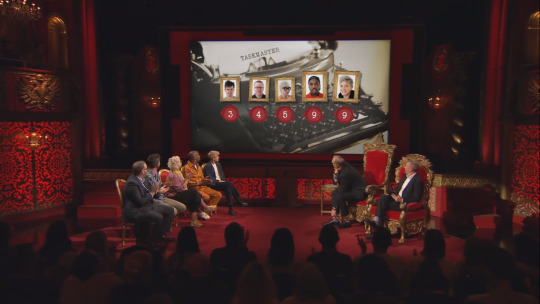
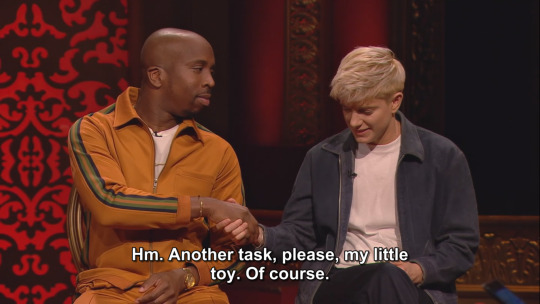
Okay, I think the winner of this season (assuming it’s one of these two... and that is looking likely, based on how things have started) should get to actually marry Charlotte Ritchie. Those would be good stakes.
- Oh, I immediately like the premise of this next task. Reward and punish based on arbitrary adherence, or lack thereof, to basic social etiquette. Leave them wondering whether to follow the etiquette or not, before and after knowing the premise. I like any task where we get to watch the premise slowly dawn on someone, and then watch them work out what to do about that in real time:



- 1) Watching Frankie Boyle unroll a ball of string while giggling like a child and batting at it like a cat is delightful.
2) I haven’t seen whatever they’re building up to yet, just paused it after Alex asked him if he’s happy. They’re going to have to roll it back up, aren’t they? Frankie won’t see it, because he’s not paying enough attention.
- Okay... so the back of the task negates the front? But if they’re contradictory instructions, can’t they argue that following either one should be as good as following the other?

I mean, fair enough, Frankie.
- Oh, title drop from Ivo. Who’s keeping stats on these things? Someone should be keeping track.
- Ivo looking for another ball of string in the house: student of the game move. That is a man who’s watched all his friends do this show over the last few years, and has memorized ideas for the sort of thing to expect. I bet there is one somewhere.
- Alex Horne: Do you think a Canadian will trust an Englishman?
Frankie Boyle: Shouldn’t do.
Me: Thank you, Frankie. I’ll keep your sage advice in mind if I ever manage to save up enough money to visit the UK.
- Mae Martin throwing the string around with abandon is... I mean. I’m trying to not just comment all the time on how attractive they are. Why is throwing string around something that makes that especially difficult? It’s something about the determination and breathless enthusiasm. This might be the biggest crush I’ve ever had on a Taskmaster contestant, despite there being some very significant competition in that field.
- It’s early in the season for this level of betrayal, really.
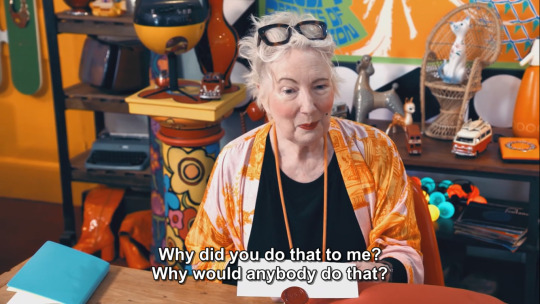
- Ooh, credit to Jenny for that workaround. I didn’t think of that idea at all.
- And Mae found it! This is another thing seeing up a Mae/Ivo dynamic, in which they both similarly care about winning, but Ivo holds back and Mae commits harder so is better at it (which is how Mae sucking up to Greg comes off as calculated, while Ivo doing it comes off as desperate). I’d be happy to watch that keep playing out all season.
- Location task! I'm on a boat, I'm on a boat, take a good hard look at the motherfucking boat!
- Okay, this is basically a Super Mario game.
- Frankie Boyle saying “We’re lining up with this bad boy” and then immediately crashing into a tree on the other side of the river from his target is the first thing all episode to make me properly laugh out loud. Other parts have made me laugh, but not as hard as that.
- I really like this task. Where did they get a barge? I hope the other location tasks are not just in that general area, but are also on that barge.
- I agree with the decision to put that Jenny Eclair crash at the beginning of the opening titles. Good stuff.
- I’ve paused it after seeing Frankie and Jenny’s attempt to say: there has to be some other way of doing it, right? Some way of going around and catching the rings, not touching them but gather them on a stick or something? Maybe that wouldn’t work. Maybe they really do just have to drive a barge.
- Yep, I’m definitely on board with Kiell playing this season with comically over-the-top confidence. That’s entertaining.
- Mae and Ivo both kiling it out there, genuinely impressive. Sorry Ivo, I might have to take back at least a few things I said about you being competitive but incompetent. We’re getting competitiveness and competence from both people here.
- Oh shit! I think this is only the second time in Taskmaster history that two people have been so close in a “fastest wins” task that they’ve shown them next to each other. The first being Chris Ramsey and Sophie Duker, which was both a very exciting individual task, and the beginning of a really good rivalry.

- Right, I obviously wrote the above two points before this happened:
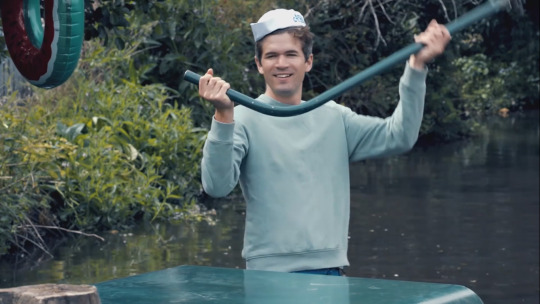
Well done with the misdirect on the photo finish, editors. That was slick.
- You know what else was slick? Mae Martin snagging those tubes like they’re a professional barge driver. God damn. Well done.
- Ivo completing the task, cheering so hard his hat fell off, and then immediately crashing into the concrete - another proper laugh out of me.
- I started this post by saying I’m amused by the idea of Ivo Graham being so afraid of Frankie Boyle that he had difficulty just introducing a prize while sitting next to him. That theory has also not been dispeled.

But based on watching him visibly squirm while they discussed his errors, and and then physically jump on the first person who tried to save him - I think this this season is going to offer me plenty of two things I like. One being highly competitive Taskmaster contestants caring way too much about doing well (from Ivo and Mae), and the other being, as I said, Ivo Graham getting crushed.
- I can’t be bothered to make a gif of this, and actually, I think the still images might be funnier anyway.


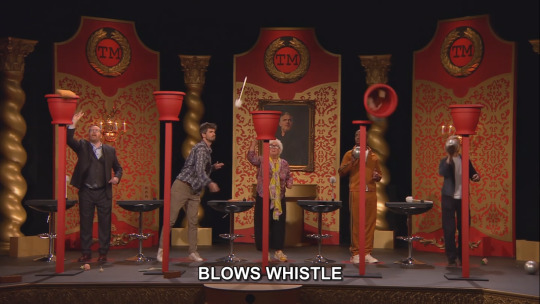
God damn, Ivo. Now I really do have to take back at least four or five of the comments I’ve ever made about your incompetence. That is… that was so cool, that you get one free pass in the future, you get to do one stupid thing some other time and I won’t even hope anyone crushes you for it.
Oh, that was genuinely good. Kiell responding in kind, also very funny. But humour aside, that was just a really smart idea out of Ivo. Fucking right.
- I tried to think of something to say about this screenshot so I could justify posting it, but I’ve got nothing, I just wanted that picture of Mae.

- Hell of a screenshot, this one is:
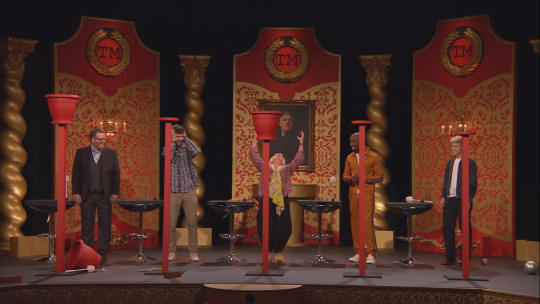
It’s a good Taskmaster episode when it produces at least one tableau that looks like it could be an ancient painting. It adds to the composition that it gets more dramatic as you work inwards - Frankie and Mae just observing, Ivo and Kiell processing what they’ve done with each other, Jenny raising her arms to the heavens.
- I like it. A strong balance in that opening episode, a solid mix. Some promising starts to various dynamics and personas, pretty much along the lines of what I was hoping for. This is going to be fucking good.
22 notes
·
View notes
Text
The time setting of Jane Eyre is ambiguous
Because this has come up twice lately, so it bears discussion.
An adult Jane, a 28 or so year old Jane, is the narrator of the story, which begins 20 years earlier. Throughout the novel, we are given several contradictory pieces of information about the setting.
There are a couple elements that point to it being set in Georgian times:
The gothic tone and tropes to fit the Gothic classics of that time;
St. John Rivers' gift of a new book, Marmion (1808);
and Jane seeing a portrait of George III (1738-1820) at the George Inn in Milcotte.
But, also:
The first edition of Marmion was way beyond the means of St. John Rivers giving it away as a present. Most likely Jane is getting the cheaper, more popular edition released in 1834.
Adele was brought to England on a steamer, and those did not start crossing the channel before the 1820s.
If the novel were set around 1808-1810, Rochester, an Englishman, couldn't have possibly been enjoying himself in Paris throughout the decade before, on account of the Napoleonic Wars.
Rochester sees Celine and her lover by street gaslight lamps, which weren't in use in Paris till 1820.
Ultimately I can explain away the king's portrait being outdated at the inn... because that stuff happens, I think (?) at least if maps at schools are anything to go by XD
It also makes sense that a book published in 1848, as an autobiography of a person writing it a decade after the events, should have the bulk of the story in the late 1830s.
So, yeah, 1996 and 2011 err by making the setting the 1840s, but most adaptations being set in the 1830s (73, 83, 97) seems right to me, and a regency Jane Eyre would feel anachronistic for me.
45 notes
·
View notes
Text
Whenever I see Lien, I'm always reminded of the masterful presentation of the gold coins in John Wick
The audience doesn't need John to turn to the camera and explain their significance. All we need is the phone call where he requests a dinner reservation for 12, then he counts out and hands over 12 gold coins, one for each body being cleaned up. The audience learn in a single scene that gold coins are the criminals' currency, dinner reservation is code for body cleanup, John is fucking loaded, and the criminal society is highly sophisticated and terrifyingly efficient
Meanwhile, Lien are designed to look and sound like credit cards, have different colors based on value like Canadian bills, and are treated like both on the rare occasion money actually comes up
I'd hate to be an accountant in Remnant
#rwde#thats not even getting into what lien actually buys#if you have 5000 lien is it a down payment on a car or does it buy a small combo at wcdonalds?#how much per year is considered a living wage? whats the poverty line? do kingdoms have a minimum wage? is the minimum sufficient?#considering that weiss is supposed to be mega rich youd think thered be more emphasis on money and economy#rich mfs will venmo you for 12 cents if you make them spill a drop of coffee#early seasons weiss could absolutely have been a nightmare like that#or be careless abt her money which would piss off folks who have to pinch pennies#like if she gifted everyone super expensive shit and didnt realize it would make them feel bad they cant repay in kind#it can feel like a kick in the pants when someone flaunts their wealth like its nothing#also weiss is a company heiress aka a business major. make her go off abt stocks or whatever#just. anything to really indicate that remnant is alive and in turmoil after the events of beacon#also does plastic exist in remnant? do grimm become fossil fuels at some point??
13 notes
·
View notes
Text
Movie Review | Rollerball (McTiernan, 2002)
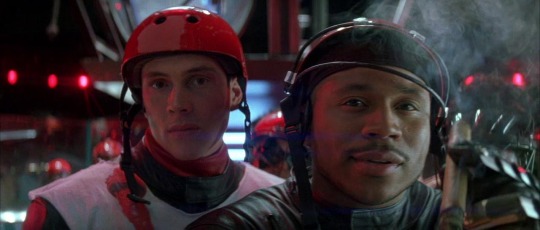
The movie so bad that it got John McTiernan thrown in prison. Okay, there was the matter of hiring a guy to place illegal wiretaps on the producer. But there’s an emotional truth in that statement.
Normally when I watch these early 2000s dipshit nu metal action movies, I tend to be pretty forgiving if they get my synapses firing. But the few shots that look like classic McTiernan aside, it is a little depressing when you have the director of Die Hard, one of the gold standards of visual storytelling in action cinema, turn out something this brutally incoherent. Probably the worst offender here is the night vision sequence, which is never pushed to the kind of paint smear look you might get with somebody like Tony Scott, so it just ends up being really hard to see. But as most movies are lit like garbage and impossible to make out now, perhaps McTiernan was ahead of the curve. The choice is additionally baffling because none of the characters are wearing night vision goggles in the scene.
It also might have helped if the movie bothered to explain the rules of the game, so that the sequences didn’t just play as unmotivated motion with arbitrary moments of emphasis. You do get the sense that this is aiming for Verhoeven-esque satire, with the locker room nudity and the bloody climax, although I wished those elements were more consistently present. I did laugh at a few moments like when the hero is told to sip his energy drink again so the cameras can see the label. I didn’t really understand the ratings meter; is higher better or lower better? It’s also interesting to note that this takes place in an unspecified Central Asian country, so you get a bit of international flavour with Russians, Middle Easterners and East Asians in the background. There are stabs at sketching out the greater sociopolitical context, but they are abandoned pretty quickly.
It also might have helped if instead of Chris Klein, either LL Cool J (who keeps bringing up but also downplaying his past as an accountant) or Rebecca Romijn (who has a facial scar she’s sensitive about that really just makes her look hotter) was the lead. Both of them are much more charismatic.
So yeah, not good.
4 notes
·
View notes
Text
John 12:3–5
3 Ἡ οὖν Μαριὰμ λαβοῦσα λίτραν μύρου νάρδου πιστικῆς πολυτίμου ἤλειψεν τοὺς πόδας τοῦ Ἰησοῦ καὶ ἐξέμαξεν ταῖς θριξὶν αὐτῆς τοὺς πόδας αὐτοῦ· ἡ δὲ οἰκία ἐπληρώθη ἐκ τῆς ὀσμῆς τοῦ μύρου. 4 Λέγει δὲ Ἰούδας ὁ Ἰσκαριώτης εἷς [ἐκ] τῶν μαθητῶν αὐτοῦ, ὁ μέλλων αὐτὸν παραδιδόναι· 5 διὰ τί τοῦτο τὸ μύρον οὐκ ἐπράθη τριακοσίων δηναρίων καὶ ἐδόθη πτωχοῖς;
My translation:
3 Then Mariam, after taking a pound of valuable myrrh of pure nard, anointed the feet of Yeshua and wiped his feet with her hair; and the house was filled of the smell of the myrrh. 4 And Judas the Iscariot, one of his disciples, the one about to give him over, says, 5 “On what account was this myrrh not sold for three hundred denarii and given to poor people?”
Notes:
12:3
Consult good commentaries for the possible identification of this story with the similar ones in Mark 14 and Luke 7. ICC & CGT conclude that Mary of Bethany is the anointer in all three stories, but that they refer to two distinct events, the present anointing of John 12 being a planned reproduction of the earlier, spontaneous one. This conclusion explains several of the oddities of the episode, including that: Mary apparently had no access to a towel in Martha’s home, that the feet were anointed (rather than the head), and that the oil was wiped off (EGGNT).
οὖν is transitional (“Then”, NIV, NET, HCSB).
ἡ Μαριὰμ is the subject of the main aorist verbs below.
The feminine 2nd aorist participle λαβοῦσα (from λαμβάνω) is temporal-antecedent (“after taking”) with the two main aorist verbs below.
ἡ λίτρα (2x, both in John) is, “a (Roman) pound” (BDAG), equivalent to 327 grams or 12 ounces, the origin of (though not the equivalent of) the English liter; NIV: “about a pint”; NET: “three quarters of a pound”. μύρου (“ointment, perfume”; see note on 11:2) is a genitive of content with λίτραν, which is the direct object of the participle above.
ἡ νάρδος (2x) refers to the (spike)nard plant of India from which an aromatic oil is derived. The genitive νάρδου is a genitive of material after μύρον above.
The adjective πιστικός (2x) is, “genuine, unadulterated” (BDAG); most translations: “pure”. The word may derive from ἡ πίστις, “trustworthy”, but ZG suggests the term derives etymologically from the Aramaic word for pistachio and indicating the base of the perfume. The feminine πιστικῆς modifies ἡ νάρδος above.
The adjective πολύτιμος (3x) is, “very precious, valuable” (BDAG), from πολύς + ἡ τιμή “price, value, worth”. NASB: “very costly”; NIV, NET, NASB: “expensive”. The two-termination adjective is the same in the genitive whether feminine or neuter, so πολυτίμου could modify either ἡ νάρδος (the word order lends toward this) or τό μύρον (so most translations).
ἡ Μαριὰμ above is the subject of the aorist ἤλειψεν (from ἀλείφω “I anoint”; see note on 11:2). τοὺς πόδας, modified by possessive genitive τοῦ Ἰησοῦ, is the direct object of ἀλείφω.
ἡ Μαριὰμ is also the subject of the aorist ἐξέμαξεν (from ἐκμάσσω “I wipe, dry”; see note on 11:2). ταῖς θριξὶν (“hair”; see note on 11:2), modified by possessive genitive αὐτῆς referring to Mary, is an instrumental dative. τοὺς πόδας, modified by by possessive genitive αὐτοῦ referring to Jesus, is the direct object of the verb.
ἡ οἰκία is the subject of the aorist passive ἐπληρώθη (from πληρόω).
ἡ ὀσμή (6x) is, “odor, smell, fragrance” (BDAG), from ὄζω “I emit a smell” (cf. 11:39). The passive of πληρόω with its object (the thing doing the filling) takes a variety of constructions in the NT, usually πληρόω + genitive (cf. Acts 13:52, Rom. 15:14, 2 Tim. 1:4) but sometimes the object is in the dative (cf. 2 Cor. 7:4), accusative (Col. 1:9), or ἐν + dative (Eph 5:18). Here alone is πληρόω followed by the preposition ἐκ (although Mt. 23:25 uses ἐκ this way with synonym γέμω). ἐκ τῆς ὀσμῆς is properly partitive, but is equivalent to a genitive of content. The genitive τοῦ μύρου modifies τῆς ὀσμῆς and denotes source.
12:4
The subject of the historical present λέγει (from λέγω) is Ἰούδας. The articular ὁ Ἰσκαριώτης (variant spelling of Ἰσκαριώθ) stands in apposition to Ἰούδας (prob. meaning, “Judas, the Keriothite”), in apposition to which stands the numeral εἷς modified by the partitive prepositional phrase [ἐκ] τῶν μαθητῶν αὐτοῦ, in apposition to which stands the substantival present participle ὁ μέλλων (from μέλλω; NRSV, HCSB: “who was about to”; NET: “who was going to”; NIV: “who was to”; NASB: “intending to”). αὐτὸν, referring to Jesus, is the direct object of the present infinitive παραδιδόναι (from παραδίδωμι) which is complementary with μέλλω.
12:5
διὰ τί is, “On account of what?”, “Why?”, modifying the main verb ἐπράθη below.
πιπράσκω (9x) is, “I sell”. The near demonstrative pronoun τοῦτο is attributive with τὸ μύρον (“ointment, perfume”; see note on 11:2) which is the subject of the negated 2nd aorist passive οὐκ ἐπράθη.
The numeral τριακόσιοι is, “three hundred”, from τρεῖς (gen. τρία) + ἑκατόν (17x) “one hundred”, which turns into root -κος in multiples (see note on 6:7). τριακοσίων is attributive with δηναρίων (“denarius”; see note on 6:7) which is a genitive of price.
The unexpressed subject of the aorist passive ἐδόθη (from δίδωμι) is the 300 denarii; NRSV, NIV, NET: “the money”. The substantival πτωχοῖς (“to poor people”) is the indirect object of the verb.
2 notes
·
View notes
Text
My media this week (11-17 Jun 2023)
youtube
📚 STUFF I READ 📚
🥰 Grounds For Divorce (Tepre) - 122K, drarry, accidental soulbound - the years of them dealing/not dealing with the Bond, the angst, Harry being a mess & figuring shit out, a trip to Egypt, family, lemon trees, a cat and a garden
😊👂 Murder at the Beauty Pageant (Miss Underhay Mystery #12) (Helena Dixon, author; Karen Cass, narrator) - Kitty & Matt solve a beauty pageant murder while hampered by a new, obstreperous Inspector
😊 Once Upon a Tome: The Misadventures of a Rare Bookseller (Oliver Darkshire) - charming, amusing & affectionate account of Oliver's journey in becoming a rare bookseller. (Oliver runs Sotheran's twitter account & if you know, you know.) [when I put the hold on this at my library there was no audiobook available but upon returning it, i see that one is there now, and i'm salty bc honestly this was the perfect book for an audiobook!]
💖💖 +74K of shorter fic so shout out to these I really loved 💖💖
A Place of Healing (this_wayward_life) - MCU: stucky, 12K - very cute & fluffy modern no-powers AU with nurse!bucky and doped-to-the-gills recovering steve who falls head-over-heels at first sight
Memories are Made of This (eleveninches) - MCU: stucky, 13K - recovering bucky angst-with-a-HEA
Long Time Coming (BewareTheIdes15) - Smallville: Clark/Lex, 14K - not my usual playground but I've enough osmosis cultural knowledge to enjoy this excellent fic; the characterizations were great - Lex's POV was absolutely hilarious, he was really going thru it
📺 STUFF I WATCHED 📺
Hot Ones - Jason Sudeikis
Why city flags may be the worst-designed thing you've never noticed | Roman Mars
Food for the Gods | 1909 Recipe
Songs That Changed Music: Ian Dury & The Blockheads - Hit Me With Your Rhythm Stick
Game Changer - s5, e7-8 "The Bachelor"
🎧 PODCASTS 🎧
Switched on Pop - Listening 2 Daft Punk: Random Access Memories
⭐Smart Podcast, Trashy Books - 566. The Blessings of Comfort Reads with KJ Charles
Desert Island Discs - Simon Pegg, actor
Our Opinions Are Correct - Mini Episode: Which Star Trek Character Deserves Their Own Show?
Rachel Maddow Presents: Déjà News - Episode 1: Riot at the Gates (Again)
Radiolab - The Seagulls
⭐Into It - How Netflix Envy Broke TV
⭐The Sporkful - Inside The World Of Food Smuggling
The Atlas Obscura Podcast - The Greenbrier
Shedunnit - Miss Marple, Spinster Sleuth
⭐Vibe Check - I’m Not Gonna Smile for You, but I Might Twerk
Ologies with Alie Ward - Pectinidology (SCALLOPS) with Samantha Lynch
Outward Plus - Lesbian Bars: A Love Story
The Waves Plus - Your Period Deserves Respect
You Are Good - Men in Black w. Stef Rubino
Our Opinions Are Correct - A Sense of Place with Jessica Johns
Into It - 'The Flash,' 'The Idol,' and 'The Ultimatum': Watch, Hate-Watch, or Skip?
Dear Prudence Plus - I Tested My Partner’s Parenting Readiness and He’s Upset. Help!
Pop Culture Happy Hour - The Flash and What's Making us Happy
The Atlas Obscura Podcast - World Famous Crochet Museum
Radiolab - Beware the Sand Striker
Endless Thread - Treasure in the Woods
Welcome to Night Vale #230 - Carlos, Explained
99% Invisible #540 - The Siren of Scrap Metal
Re: Dracula - June 17: Die Away in the Distance
ICYMI Plus - Was the MirandaSings Controversy Inevitable?
Outward Plus - Pride Special: Why the Law Cares About Your Sex
Switched on Pop - Chartbreakers: Mexican regional y más
⭐Hit Parade Plus - Yes We Can Can Edition
Wait Wait… Don't Tell Me! - James Marsden
🎶 MUSIC 🎶
Juice Newton radio
The Essential John Denver
The Complete Albums 2000-2009
Pop Radio • Workout
Kylie Minogue's entire 14 album, 32 yr discography in order + 3 special compliation albums
Pop Radio • Pump-up
Trip Hop Instrumentals
The Pointer Sisters
#sunday reading recap#bookgeekgrrl's reading habits#bookgeekgrrl's soundtracks#miss underhay mystery series#oliver darkshire#fanfic ftw#hot ones#ted talks#b dylan hollis#game changer show#kylie minogue#the pointer sisters#juice newton#john denver#into it podcast#smart podcast trashy books#hit parade podcast#vibe check podcast#the sporkful podcast#re: dracula#99% invisible podcast#welcome to night vale#desert island discs#switched on pop podcast#the atlas obscura podcast#shedunnit podcast#endless thread podcast#rachel maddow presents: déjà news#wait wait...don't tell me!#ologies podcast
4 notes
·
View notes
Photo

AC-a-a-a-a-B, screamed the goat
again, we see the police PR machine & a complicit press present the innocuous, bumbling barney fife ‘we’re here to protect’ trope.
the ubiquitous coverage of the screaming goat has reached an international audience [if the BBC counts in that regard].
it reminds me of the ‘ah, look! cops dance with ice cream’ which should have been ‘two scoops of fuck you.’
__
one of the more recent and disgusting examples of police PR/media collaboration has been the ‘viral’ PR: ‘Police dog in Wyandotte accused of stealing fellow officer's lunch.’
this ‘story’ originated from a facebook post by the Wyandotte PD, with an accompanying image edited to appear as a mugshot of a black police dog – named ‘Officer ICE.’
however, i found this posted on a ABC affiliate news website, on the same page as an article about Tyre Nichols’ family pleading for justice and calls for the bodycam footage to be released.

__
the timing and content of these press releases is no coincidence.
on august 1 2016, within weeks after the series of murders by police of Delrawn Small, Alton Sterling and Philando Castille, the cop PR machine rolled out #copsgiveouticecream.
one particular headline — ‘these cops pranked drivers by giving them ice cream instead of tickets’ — fell under the ‘feel good’ category, much like ‘officer ice’ and case of the screaming goat.

text beneath the image reads: "You can see the sense of relief when the officers explain this ‘violation’ to the anxious drivers who all got a big laugh out of it."
i can see intimidation, fear, injustice…
‘no cameras!’ — nor accountability
social media has changed the playing field in the propaganda war for policing. like in the instances of feel good news, cops only like social media when it works in their favor.
the fbi has warned about ‘cop baiting,’ ‘viral attack’ and potential liability. [Social Media and Law Enforcement: Potential Risks; leb.fbi.gov]
unsurprisingly, this particular article expresses an overarching sense of fear and need for control:
Empowered by social media, cop baiting presents a crisis for law enforcement. Questionable videos of police officers are popular on sites, such as YouTube, and can be financially rewarding to malefactors who file claims or lawsuits. For some individuals, a citation or jail time is worthwhile if a cash payoff results. Cop baiting could become so common that officers may not know whether they are facing a situation that is legitimate, staged, or exaggerated for someone else’s benefit. This puts officers’ personal and professional well-being at stake.
so strange, their fave defense for surveillance [search, et al] isn’t mentioned: ‘if you’re not doing anything wrong, why worry…’
copspeak + providing those good feels
i posted the link back in 2016, but i find it’s still relevant:
Copspeak: 7 Ways Journalists Use Police Jargon to Obscure the Truth [fair.org]
FAIR’s CopSpeak series is good for examining the media-PR symbiosis:
“The linguistic gymnastics needed to report on police violence without calling up images of police violence is a thing of semantic wonder."
privatization of public policy has helped drive much of this.
[Meet the Company That Writes the Policies That Protect Cops; motherjones.com], [Police Policy For Sale; theappeal.org/].
the lexipol rabbithole can take you through an insular cop-cult[-ure] & convenient shopping for all of your militarized force needs.
‘Police Chief Magazine’ run by a 503c lobbying group, International Association of Chiefs of Police [IACP], reveals some PR tactics in ‘Media Coverage: When It Doesn’t Work Well… and When It Does’ [policechiefmagazine.org]
The Secrets to Success
“It is the role of the public information office to push the positive stories to the media,” says Sergeant John Roth, Glendale Police Department’s public information officer (PIO). His office publicizes the department’s Coffee with a Cop events, as well as other newsworthy items, such as when major cases are solved. …
it is imperative to develop a rapport with media representatives. He makes a point of meeting with them and establishing relationships built on trust.
‘trust us,’ said at gunpoint…
[btw, national police week 2023 has begun]
#acab goat#acab#tyre nichols#defund the police#defund police#demilitarize the police#policing#press release#media#mass media#press agencies#police violence#police terrorism#systemic violence#national police week#public policy#stop cop city#no cop city#communications#mass communication#police state#antifa#2023
4 notes
·
View notes
Note
I do think some of Paul’s weirdness could be explained by a potential reunion that never happened before John died. There are a couple of accounts that suggest they saw each other much more recently before his death than Paul says. Why he’s doing that I’m genuinely not sure. I could speculate but that’s not what you’re asking, so I won’t.
Please do speculate! I find it fascinating that there are so many corroborated statements that suggest John and Paul were planning on writing together/already doing so in 1980, but they don’t seem to have gained traction with Beatledom narrative and certainly, Paul or Yoko haven’t gone out of their way to correct the official story. If there was even the most embryonic of plans to write together, that would suggest a) they were in communication b) they were getting on and c) they were getting on better than they had done for a decade (I’m extrapolating, but if relations had been too fragile to partner up again at any point from 69 then *something* had to have shifted or improved)? I’m guessing that regardless, John and Paul were tentative about this, so perhaps this in some way accounts for Paul’s weirdness.. but I can’t help thinking there is (much) more to it.
I genuinely don't know.
Like you say, if they were planning something then it must have meant they were getting along pretty well. But also, it just seems they were always like one small step away from it. Paul lasted all of two years after the worst of the break up nonsense before he's asking John back on his album.
That said, we do know they'd spent a few pleasant evenings together and were toying with the idea of appearing on Saturday Night Live. So, there was a decent relationship there - including the phone calls Paul mentions. Also, if John called about Jim's death, it's just not true that he was never the one to reach out. Perhaps that and John sending him that Christmas present were the only times it happened. But, I also think it's likely that while Paul did the majority of the calling/chasing, John did some back. He just must have for Paul to think it was worth him pursing John.
I was talking to @merseydreams about something tangentially related. Like, it's possible that they weren't getting on better, and that’s why they wanted to make music again. But maybe they wanted to reconnect and music seemed like the best way to do that? Getting back, as it were. Although, I think it’s the latter (given John’s complaints about Paul) I still think it’s a nice thought.
Anyway. Why is Paul lying about it/not saying. I can think of a few reasons. They don't make sense to me, but perhaps they would to him.
He wants to avoid the constant questions that would bring up. Especially because this likely wasn't a Beatles reunion
It's too painful for him
He's worried people won't believe him or think he's just saying it for clout or whatever
Yoko doesn't want him to
It was such a lose arrangement he feels silly bringing it up
Like I say, I don't see why this stops him saying they'd at least talked about it? But, who knows. It certainly doesn’t explain why he’s not admitting to seeing him more recently than it seems they did. I, personally, think it must be on Yoko’s behalf, it’s the only real explanation that makes sense to me. Other than it being to painful, but Paul has talked about a lot of painful things.
So, why doesn’t Yoko want it? Could be related to the rumoured divorce i.e. it was going to be what John did after that. Or it’s just something that she thinks John wasn’t sure enough about to make public so Paul shouldn’t. Or she thinks it gives Paul and John too much focus, because you know that’s all that would have been talked about. Or it’s some other Yoko whim that’s beyond our comprehension.
What do others think?
15 notes
·
View notes
Text

THE SOUND OF HEAVEN
"When the day of Pentecost came, they were all together in one place." - Acts 2:1
Pentecost happened at an appointed time, in an appointed place, with an appointed people.
God is still looking for a desperate people who are longing to meet with Him in surrender to His presence, so that He might fill us up with the power of His Spirit and send us out to a world in deep need of His transformational love.
GOD POSITIONS US
"Suddenly a SOUND like the blowing of a violent wind came from Heaven and filled the whole house where they were sitting." - Acts 2:2
At Pentecost, the sound of Heaven was released on earth with awe-inspiring effects; it must have been an awesome event to witness the wind and the fire from Heaven as it came in fulfilment of the promised gift of the Holy Spirit being given to the Church. We can never outdo God, and the "latter rains" of His glory will come as such a deluge that we will never be able to fully prepare for what is comingyet God expects us to be prepared for blessing and breakthrough by stoking faith, expectation, and exhibiting His love, presence, and power in our hearts.
They saw what seemed to be tongues of fire that separated and came to rest on each one of them. (Acts 2:3)
In this Pentecostal, pre-ordained moment of outpouring, everyone's spiritual eyes were opened to see how Heaven was touching earth. No one was in any doubt that God was on the move!
It is said of the Azusa Street Revival that fire was seen coming down from Heaven to touch the little warehouse where the revival meetings were held, and simultaneously, fire was seen rising up from the roof of the same building. When the fire of God was burning – everyone could see the fire!
AZUSA STREET REVIVAL ACCOUNT
The following extract (from John Lake) vividly recalls a moment of the fire of God burning in Azusa Street:
"When I asked her to describe the Shekinah Glory Fire reported by many, she told her story. She recalled the fire department coming because of a call that the building was on fire. When they arrived, they didn't smell any smoke or see any evidence of fire. She remembered that it was Seymour, Bosworth, Lake, Smith and Sines that ran out.
Sister Carney did go out one time to see the flames for herself. Remember, the fire department had been called on several different occasions, as passers-by would report seeing flames leaping up from the roof of the building. Finally, Sister Carney asked John Lake why the fire department kept coming and looking for the fire. He explained that the fire was coming down from Heaven into the building and fire was going up from the building and meeting the fire coming down. Fascinated, Sister Carney went out, walked about half a block and saw the awesome sight for herself. To her, this divine connection was just further evidence of God's mighty Presence in that place.
Sister Carney noted that although the Shekinah Glory was present all the time within the building, this divine connection wasn't an everyday occurrence. Whenever this connection was present, the power was even more intense within the meeting."
The glory of God is sometimes visible as a cloud or mist (see Exodus 24:16-17). Jesus also spoke about wanting us to see His glory: "Father, I want those you have given Me to be with Me where I am, and to SEE My glory, the glory You have given Me because You loved Me before the creation of the world" (John 17:24).
"They saw what seemed to be tongues of fire that separated and came to rest on each one of them." - Acts 2:3
The fire of God that touched the Believers on the day of Pentecost was a personal encounter with the holy presence of God. We cannot remain the same when we have met with God in the inner chamber of His heart. His FIRE consecrates us and sets us apart for His work. His FIRE speaks of holiness and purity, bringing healing and cleansing wherever it comes to rest. His fire is His love, and our hearts melt in the beauty of His presence.
It is said of Messiah, "The mighty man will become tinder and his work a spark; both will burn together, with no one to quench the fire" (Isaiah 1:31).
In the wilderness, the nation of Israel looked differently from all the other nations because of the presence of God with them -- the pillar of fire. Pentecost was God's fiery kiss of love, searing and sealing His Bride, which moved the pillar of fire from being with us to NOW BEING IN US.
WE ARE CALLED
We, too, are called to a baptism of the Holy Spirit – and FIRE, "I baptise you with water for repentance. But after me will come One whose sandals I am not fit to carry. He will baptise you with the Holy Spirit and with fire" (Matthew 3:11).
Today, may we as God's people posture ourselves with the love of Jesus flowing into and through our hearts adoring Him with all that we are so that He might release a fresh wave of the Holy Spirit and glory FIRE upon – to and through us for the expansion of God's PURPOSE for our lives!
ALBERT FINCH MINISTRY
4 notes
·
View notes
Text
Monday 22 August 1836
7 ½
12 20
no kiss fine morning and F58 ½° at 8 ½ - copied into Business Letter book letter of yesterday to Mrs. and wrote and copied letter to ‘John Harper Esquire St. Leonards’ Place, York’ vid. 7th line below to say however happy I should be to oblige the committee of the new Dispensary, sorry I could not do it in the instance of letting Mr. Husband act as their clerk of the works - he had too much to do already - should be glad to hear of Mr. Gray as soon as Mr. Harper had any certain intelligence of him - to bring the drawings of Shibden the next time of coming - their wheel-race to be done with Roman cement according to Mr. Harper’s plan ‘of which, I hope, time will prove the efficiency’ - had Mr. Husband at 9 ¼ - he gave me the levels of the mill-site - wrote them on the outside of the letter, under the seal - gave orders to Mr. Husband about letting water into the meer completing the clow - etc etc he took to the post my letter to Mr. Harper - breakfast at 9 40 - Had Joseph Mann at 10 20 - paid him for the last fortnight - and the Walker pit coal account - and received for 268 loads of low bed (out of 457 of which AL- had 178 and Holt 11 loads) at 8d. £8.18.2 - and received 4/4 for the last fortnight of Whiskum bar - Hainsworths carts have not gone along the road since the road was given up on Tuesday the 9th instant - A- had Mr. Parker before 11 about the Hipperholme quarry road - Mrs. Wadsworth will lease the privilege of using it for 7 years - A- to propose a rent - I thought Mr. Parker had best go and see the quarry and judge for himself - A- and I walked with him there - explained - A- proposed paying 2/6 a year - we asked Mr. Parker’s opinion - but could not get him to give any - to say whether he thought ½ a crown a year too little or enough - he said it was for A- to propose what she thought right - he had felt himself delicately situated between A- and Mrs. Wadsworth - my impression was that he thought the privilege a valuable one - worth a good deal - and ½ crown too little - I said A- certainly could not at present road out the stone and anyone in Mrs. Wadsworth’s might take advantage of this - but A- could make herself a road (she would not let me explain how) and I thought it would be ridiculous to offer a rent of pounds or guineas for a road A- might possibly not use after I had got what stone I wanted - Mr. P- said Mrs. W-‘s life was not worth much purchase, and afterwards all would be easy - colonel Fitzgeald was at a great deal - when Mr. P- saw that I took colonel F- to be really the heir he (Mr. P-) said but I don’t mean to say anything - it is what they say - I took no notice of this - I believe Mr. P- to be an executor - at least, he sometime ago, when consulting me about the elevation of Mrs. W-‘s alms houses, strongly impressed me with the idea of his having made the will, and being executor - he seemed rather ill at ease with A- and me - she said very little - I kept up conversation with ease, but still with a certain civil gravity that savoured not of high and special favour - we wished him good morning at the quarry-gate - A- had declined making any wall, or doing more than promise to do her utmost to keep the gate shut - we returned into the quarry, and waited there till Mr. P- was out of sight - then returned by Mytholm and Listerwick and came in at 1 10 - ½ hour at my desk - settled with John Booth - paid him up to tomorrow - called down to one or other, and backwards and forwards - getting furniture into my aunt’s little apartment and with Robert Mann + 4 at cutting away the terrace near the west tower or with the 2 masons in the servants hall - pulled up fire-place and made chimney vent drain all under the intended flag-floor - the coach house court great pillars removed this morning and 2 masons rebuilding them for entrance into the new garden - 2 of Mark Hepworth one horse carts and Frank and mine carting away terrace to bottom of coalpit field as before - Charles and James Howarth busy in my aunt’s little apartment as also the 2 York joiners, and Mrs. Ann Lee - Matty here today dressing the flock beds - Mr. Husband here again about 5 pm - A- rode to H-x bought fender etc for my aunt’s parlour and then rode to Cliff hill - dinner at 7 - coffee - in my aunt’s little apartment again - sat there talking sometime - had not got all quite ready for my aunt till 10 - then sat with her ¼ hour in the drawing room and saw her into her little apartment at 10 20 - ten minutes with her looking about - she seemed pleased with her little box of a bedroom made out of the old coach house (phaeton house) - then A- read 2pp. of French and till 11 25 I wrote all but the first 13 lines of today - fine day till about 7pm when very heavy shower and some rain afterwards - F50° now at 11 25 pm
4 notes
·
View notes
Note
I'm back with the TenxMartha rewrites: The Lazarus Experiment edition.
-On their way to the Lazarus expo, while they're at the Tardis, The Doctor hands Martha a large box with a ribbon. He waits anxiously as she opens the box and helds up a beautiful burgundy dress, for her to wear to the gala.
(I truly don't remember if the dress on the show was Martha's or if she found it in the Tardis closet, but my headcanon is that The Doctor gave it to her).
A beaming smile blooms on her face and she rushes to changing room.
-The Doctor is waiting by the control room when Martha comes out wearing the dress and asks him how she looks, only for him to stutter like a doofus.
-When they get into the Expo, The Doctor attacks the nibbles and offers some of them with Martha, feeding one of them into her mouth, and are interrupted by a cough from Tish.
-When The Doctor inquires about the motive of the expo, he and Martha exchange some geeky theories, making Tish's eyes darth back and forth between the two of them.
-When Francine arrives with Leo, Martha introduces The Doctor as John Smith and explains they met while she was working at the hospital. This time, The Doctor knows a bit more about Francine to not make a complete embarassment of himself. He still comes off as slightly weird to Francine.
-When Professor Lazarus finally appears and explains the purpose of his experiment, Martha and The Doctor exchange a look. When the machine Lazarus is in begins to malfuction, both jump into action, working together to stop the experiment from going south.
-The moment a de-aged Lazarus steps out of the machine, Martha chides him for his lack of care and for messing with concepts he's doesn't fully understand, much to the amusement of those present, except for The Doctor and her family.
-Lazarus waves off her words and advices that she should stick to what she knows, to what The Doctor snaps back that he should heed his own advice first.
something i find so funny about the lazurus experiment is that they meet 3 of martha's family members, and they all separately, but immediately, see ten and martha and think "oh they fucking"
ten and martha being weird in public <3. i love the idea that people view them as like. on all accounts a very normal and polite young woman and that unhinged loserboy with her.
"the doctor attacks the nibbles" is a very apt statement LMAO.
6 notes
·
View notes
Text
My first of many Arts and Culture pieces with the UO! As well as the first time I worked with Dylan O'Neill, now with the Examiner. Dylan was such an invaluable support to me during my first two years at the UO, and this piece on the casting of Jodie Whittaker as the Thirteenth Doctor really set us off on the right foot.
The article was originally published in November of 2017, and can be read at the link above, or in the read below.
Heather Reynolds deconstructs the myth surrounding role model exclusivity in media and literature.
This summer, on July 16th, the next actor to be cast as the Doctor was announced during a minute-long short on BBC One. As always, the hype for this event was huge. The topic was trending on most social media sites hours before the announcement was made. The conversation was overrunning other hashtags, such as Wimbledon and BBC News, with fans waiting with baited breath to see who would be taking over as the star of a show with a legacy lasting over fifty years. However, through all of these posts, tweets, and hot takes, one query surfaced time and time again. Would this announcement finally see the introduction of a female Doctor?
The time for the announcement came, Jodie Whittaker was announced as the new lead of Doctor Who, and the overwhelming response was positive. The majority of fans, men and women alike, were excited about the new opportunity this presented, with many pointing out how it was about time. Considering how many other Time Lords were known to regenerate into different species, transcending gender seemed like a small step in comparison. This wasn’t even the first time the modern iteration has had a Time Lord regenerate into a body that would be perceived as a different gender, with the role of the Master being portrayed by Michelle Gomez since series eight, taking over from John Simm’s Master. By all accounts, while it is a first for the Doctor, it isn’t a big deal in the show’s canon.
“The obvious response to this is: why can young boys not see a confident woman as a role model?”
However, while many rejoiced over this new role model for young girls in popular fiction, and others felt no particular way about it, there were many viewers who held incredibly negative views about the casting. Some felt robbed of the grandfatherly nature of the Doctor, who had endeared them to the role originally, and some felt that it was too much to explain to children that the Doctor, who changed body every few series, had done it again but a bit differently. The majority of criticism received was due to young boys having one less role model to look up to. The obvious response to this is: why can’t young boys see a confident woman as a role model?
This occurs time and time again with modern fiction, where men are seen as role models for all, and women are seen as just role models for young girls. Most modern television for children has male leads, including shows that are not geared towards a specific gender, whereas female led shows are perceived as a ‘girl thing.’ According to a recent study, 57% of protagonists in children’s literature published between 1990 and 2000 are male, with only 31% of lead characters being female. The remainder are animals, of which only 1/3 are female. Books and television shows with female leads are seen as less marketable, and are more likely to be turned down by those in charge in the industry.
However, this perception that boys cannot relate to a female protagonist has little basis in reality. The majority of children, regardless of gender, will look up to and relate to the ‘good guys’ regardless of who they might be. They may relate to some more than others, like the character that wears glasses like they do, or plays soccer like they do, but gender is often the last thing on their mind when looking at an ensemble cast. Many young children who feel ostracised by their ‘nerdy’ nature find solace in characters like Matilda and Eliza Thornberry, while others get the courage to stand up for what they believe in from characters like Mulan and General Leia Organa.
“While Skulduggery is the titular character, it is Valkyrie’s story and she is the character people emote with, boys and girls alike.”
To take a more Irish example, the Skulduggery Pleasant series by Dublin-based writer, Derek Landy is geared towards those aged 11 up into their late teens. The ten book series is based around a skeleton detective who solves murders and can summon fireballs into his hands. It, by all intents and purposes, sounds like the ultimate teen boy series. However, it has one clear difference from the other books you will find in this genre. Its protagonist is a teenage girl. While Skulduggery is the titular character, it is Valkyrie’s story and she is the character people relate to, boys and girls alike.
Female role models are for everyone, not just girls, and to limit the extent of their impact is to ignore and undervalue the immense good they do to the lives of so many children and adults alike. It’s long past time to gear media towards different children, instead of targeting children based on gender, and so, really, who cares about the gender of the actor who plays the Doctor, so long as they keep the fun and whimsy of the show alive?
Doctor Who returns to screens on Christmas Day on BBC1.
#article#ucd#university observer#doctor who#representation#archive#this is so old my apologies if it pops up in main tags#jodie whittaker#fun that doctor who is still returning to screens on christmas day on bbc1
0 notes